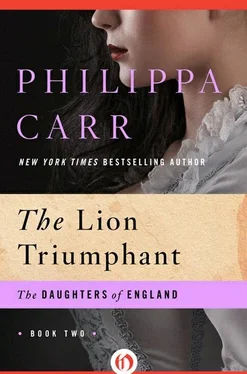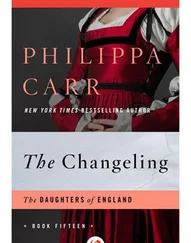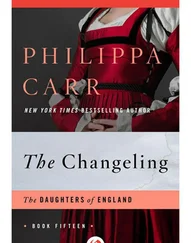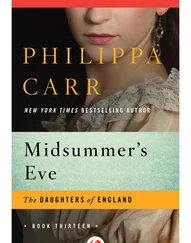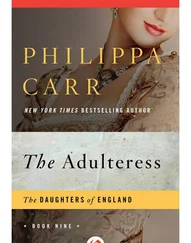The bedclothes were being gently drawn from the bed.
I opened my eyes. Standing at the foot of the bed was the figure I had seen before—shrouded in gray. Over the head was a hood which covered the face; there were slits for the eyes to see through.
I lay still waiting. The figure moved not toward me but to the door. It stood there and I was ready to leap out of bed—tense waiting. As soon as it moved I would be after it. I would tear off that concealing cover. I would find out who was hiding beneath it.
And suddenly there came to my mind: What if it were indeed a ghost? What if the ghost of Isabella had come to haunt me? What part did I play in her sudden death? Was it murder? And if it was, was not I the motive for that murder?
And why should I think of Isabella at such a moment? How could I say except that there was something about that shrouded figure which had brought her to my mind?
Ghost or not I was going to find out. The figure moved backward. Then I saw a hand emerge. The finger was beckoning me.
I was about to leap out of my bed when my instincts warned me. If there was a murderer concealed behind that shroud it was the same person who had been dosing my food. I had feigned a lassitude I did not feel. I must behave like a person who was under the influence of poppy juice.
I rose slowly from my bed.
The hand disappeared; the figure had moved out into the corridor.
I went out. The figure was a few yards away. The finger beckoned me again.
Trying to act like a sleepwalker, I followed.
The figure had disappeared around a bend. I hurried after it. I came to rest at the top of the great staircase which led into the hall.
There was no sign of the shrouded figure.
I stood at the top of the staircase; and then I knew. Someone was behind me, hands stretched out, waiting to hurl me down those stairs.
I turned and grappled.
I heard someone shout: “I’m coming,” and there was my daughter Linnet. She seized the shroud. The three of us were huddled together for a moment. I felt myself lifted off my feet. Then suddenly there was a wild scream. I found myself clinging to a piece of gray cloth as a figure went crashing to the foot of the staircase.
Linnet and I did not speak. We ran down the staircase to that crumpled figure, which lay face downward. I lifted the hood and the mask that fitted over the face.
“’Tis Manuela,” I said.
She did not die until three days afterward. Poor tragic Manuela!
She was conscious and lucid for a while before death overtook her. I was at her bedside and she was aware that I was there. She had little time left, she said, and much to say.
To think that this Spanish woman should have lived in my household for so many years and I know so little of her! How strange that she should be so devoted to Roberto and yet plan to kill his mother.
It was vengeance. Just retribution, she called it.
“As soon as I saw the ruby cross I knew that I would kill you,” she said. “Before that I just wanted to make you suffer.”
“But you did not attempt to kill me until last night,” I reminded her. “You gave me small doses of poison and tried to rob me of my reason.”
“That was what happened to Isabella. She was ill; she was robbed of her reason; and then one day she was thrown down the staircase.”
Her story was told jerkily, far from lucidly and not at one sitting. I had to piece it together to make a coherent whole. She was very weak, but she wished to tell it. It was a kind of confession. She wanted extreme unction, and I was determined that she should have it if I could manage it. It would mean running some risk, but I had known of Catholic families in the neighborhood and I would ask if a priest might come to ease Manuela’s last hours.
He would have to come in secret, but I would defy Jake, if necessary, to bring her this last consolation.
I learned that Manuela was a half sister of Isabella—her mother having been a serving girl in the mansion which was Isabella’s home. Manuela had been given a place in that mansion as soon as she was old enough to take it and had been sent to Tenerife when Isabella went there to marry Don Felipe.
She had been present when Jake had stormed the mansion; she had successfully hidden herself from the marauders. She had assisted at the birth of Carlos and had loved the boy. It was only when he came to England and threw off all his Spanish ways that she turned to Roberto.
But the gist of her story was Edmundo. She had loved him and they were to have been married. She had greatly admired the ruby cross which Isabella wore frequently. She had even taken it once and worn it when she went to meet Edmundo in the garden—a sin for which she had done penance.
Edmundo had said: “I would I could give you a cross like that.”
Perhaps someone had heard him. In any case the cross was missing and Edmundo confessed that he had strangled Isabella, then thrown her down the stairs. He had done it, he admitted, because he had stolen the cross and been discovered in the act by Isabella, who had threatened to have him arrested for robbery.
Manuela had accepted this because she knew he loved her and the cross was missing—until she had seen me wearing it. She believed then that it had been in my possession ever since, that Don Felipe had given it to me and that therefore I must have known that Edmundo had not stolen it and only admitted to doing so under torture which few men could stand out against.
It seemed clear to her that Edmundo had killed Isabella on orders from his master. A servant belonged to his master and if certain deeds were demanded of him he performed them, but any sin incurred was not on his conscience.
When Edmundo was arrested Don Felipe should have saved him, but he had not done so. He did not want anyone to know that Edmundo had killed Isabella on orders from him. The situation was fraught with danger because Don Felipe wished to marry me and there were rumors in circulation that I was a witch and a heretic. Therefore, Don Felipe dared not make any move to save Edmundo because by doing so he could turn suspicion on himself and I was involved. The ruby cross provided a good reason why Edmundo should have committed the murder and so Don Felipe was content for this to be the accepted version of the affair, although the cross all the time was in his possession, while poor Edmundo, tortured until he admitted that he had stolen it, was condemned to death.
When Manuela saw me wearing the cross she believed that I had had it all those years. It had not occurred to her that it was one of the valuable objects which Jake had stolen when he raided the Hacienda, that it had been in his possession ever since and he had only recently given it to me.
She had always hated me. She had blamed me for what happened. But for me, she was sure that it never would. In her view, I was, therefore, responsible for Isabella’s death. It was she who had aroused Pilar’s venom against me; it was she who had made the image of Isabella and put it in my drawer. She had taken it to Pilar and it was to have been used as evidence that I was a witch.
And then because she knew that there had been suspicion in my mind, she had sought to make it grow. She wanted me to suspect my husband was planning to murder me. She had put the image among Jake’s clothes and waited for me to find it. Her revenge was slow and painstaking. She was in no hurry. She had infinite patience. All she wanted was my uneasiness—until she saw me wear the cross.
Then there was no doubt in her mind of Felipe’s guilt and mine. She brooded on the happy life she might have had; on the children of her union with Edmundo who had never been born. She was fierce and passionate; she could find no satisfaction in anything but revenge.
Читать дальше
